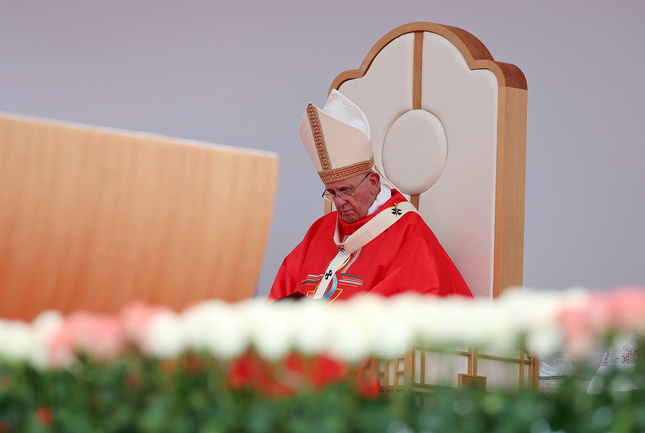-
Pope Francis’ Encyclical Calls for Integrated Development – Just Don’t Say “Reproductive Health”

Pope Francis sparked worldwide discussion and jubilation among many green advocates after releasing Laudato Si, the first Papal encyclical to focus directly on the environment. The pontiff touched on everything from pollution and sustainable development, to anthropogenic climate change and water security in his 180-page missive. He uses remarkably strident language to condemn the economic systems which he sees as the root of environmental degradation, excessive consumption, and global inequality, switching between thoughtful ruminations on what is right and cold, hard statistics:
If we make something our own, it is only to administer it for the good of all. If we do not, we burden our consciences with the weight of having denied the existence of others. That is why the New Zealand bishops asked what the commandment “Thou shall not kill” means when “twenty percent of the world’s population consumes resources at a rate that robs the poor nations and future generations of what they need to survive.”
“We need an integrated approach to combatting poverty and protecting nature”Advocating for global solutions, he stresses how exploitative economic and social structures create environmental change that disproportionately affect the poor and other marginalized communities. By framing environmental protection as a moral imperative, Francis grounds the discussion in a religious framework that encourages introspection and re-energizes efforts to combat climate change.
“We need an integrated approach to combatting poverty and protecting nature,” Francis writes. “We have not yet managed to adopt a circular model of production capable of preserving resources for present and future generations, while limiting as much as possible the use of non-renewable resources, moderating their consumption, maximizing their efficient use, reusing and recycling them.”
Such integrated approaches to environmental management and development do exist. From Nepal to Ethiopia, many so-called “population, health, and environment” projects have an explicit focus on combining poverty alleviation with natural resource management and conservation in often-marginalized communities. But the “P” in PHE may be a sticking point.
While the encyclical is extremely progressive in many ways, Pope Francis’ stance on contraceptives remains unchanged from traditional Catholic doctrine. In paragraph 50 he notes that “attention needs to be paid to imbalances in population density” and alludes to the fact that consumption in poorer countries may not remain so low, countering a frequent argument as to why demography doesn’t matter to global environmental change. But he also suggests “reproductive health” programs are thinly veiled efforts by developed countries to reduce poorer populations and avoid having to deal with the effects of “extreme and selective consumerism.”
PHE projects and other development programs that incorporate reproductive health would argue that it’s not about numbers at all, but rights. Poor and marginalized communities facing the direct effects of the worst environmental degradation often have the worst access to health services, including contraceptives. This is a major quality of life and health problem, especially among the most marginalized of the marginalized: poor women and girls. Being able to decide when and how many children to have is a human right that, unrealized, contributes to the kind of inequality Francis opposes.
He suggests “reproductive health” programs are thinly veiled efforts to reduce poorer populationsIn the Philippines, where many are reliant on the land and sea for food and livelihoods, rapid population growth contributes to food insecurity, poverty, and biodiversity loss. Twenty-two percent of Filipino women have an unmet need for family planning, higher than most other countries in the region, thanks in part to Catholic resistance to reproductive health efforts. PHE programs have been active in the archipelago, working at the community level to shrink the gap in unmet need and reduce demand-side strains on natural resources and the environment, like in the village Humayhumay. “When you have a community like this that’s so small, tight-knit, and very much living off the land and from the land, all of these things make sense,” said Sam Eaton at the Wilson Center after a reporting trip in 2013. “It’s putting food on the table. It’s making sure that your kids have three meals a day so they can concentrate in school, so that they can go to school.”
The project in Humayhumay, by PATH Foundation Philippines, Inc., was one of several PHE programs across the islands that integrated environmental conservation with reproductive health services. Building on the lessons of PATH, the BALANCED Project also implemented PHE programs in the Danajon Bank Marine Bioregion in Bohol and the Verde Island Passage.
The Pew Research Center estimates 81 percent of Filipinos are Catholic. In 2013, Philippine lawmakers passed a reproductive health law to develop sex education in schools and increase the accessibility of contraception to women. Yet less than a year later, a vocal Catholic majority pressured the Supreme Court to strike down parts of the policy. PHE interventions have had to work around these roadblocks to bring integrated, community-level change, even as national legislation lags.
The fact that Francis is engaged and speaking out so strongly on environmental change is a huge step in itself. His call for more integrated efforts to combat poverty and environmental degradation together is even better. But it’s clear there are still some cultural hurdles – perhaps related to the Church’s male-dominated leadership – to overcome in terms of the connection to health and reproductive rights.
Sources: The DHS Program, The Holy See, The New York Times, Pew Research Center.
Photo Credit: Pope Francis on a visit to Korea in 2014, courtesy of Jeon Han/Korea.net.
Topics: adaptation, Africa, climate change, community-based, conservation, consumption, demography, development, environment, Ethiopia, family planning, featured, food security, gender, global health, livelihoods, mitigation, natural resources, Nepal, On the Beat, PHE, Philippines, population, poverty, risk and resilience
 A Publication of the Stimson Center.
A Publication of the Stimson Center.



